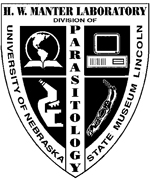Parasitology, Harold W. Manter Laboratory of

Harold W. Manter Laboratory of Parasitology: Library Materials
Document Type
Article
Date of this Version
2016
Citation
Parasites & Vectors (2016) 9: 33.
doi: 10.1186/s13071-016-1322-y
Abstract
Background: The Molavi street archeological site south of Tehran, Iran accidentally provided a unique opportunity for paleoparasitological studies in Iran. A female skeleton was unearthed and evaluated to be 7,000 years old. Soil samples were collected around the pelvic and sacrum bones.
Findings: Careful microscopic investigation of rehydrated soil samples revealed the presence of one Enterobius vermicularis egg attached to the skeleton sacral region.
Conclusion: The present finding likely represents the oldest evidence of a human pinworm infection in Asia.
Included in
Archaeological Anthropology Commons, Biological and Physical Anthropology Commons, Parasitic Diseases Commons, Parasitology Commons


Comments
Copyright 2016, the authors. Open access material.
License: Creative Commons Attribution 4.0 International License (CC BY 4.0)